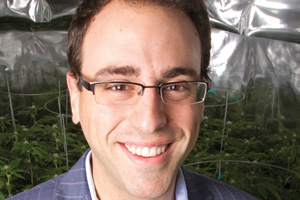
Justin Hartfield claims to have been getting high since he was 13. But don’t mistake this former high-school pot dealer for “your run-of-the-mill stoner”, says The Wall Street Journal. Hartfield’s aim is “to become the Philip Morris of the American marijuana industry” – and his timing looks propitious. Prohibition, he says, is “about to pop” and entrepreneurs positioned “intelligently” are poised to clean up.
“The culture war is not over,” says Hartfield, “but it’s in its final rounds.” Two states, Colorado and Washington, have already legalised marijuana for recreational use (Oregon and Alaska may follow suit this year). Twenty more have made it legal to buy dope for medicinal purposes.
Hartfield is executing an “internet-age version” of the strategy that enabled boot-leggers such as Joseph Kennedy –who secured “medicinal liquor” permits during Prohibition – to hit the jackpot when the anti-alcohol law was repealed in 1933.
The “green rush” taking hold in America has already transformed the fortunes of Hartfield, 30, and his company, Weedmaps, says BusinessInsider.com. Since starting out in 2008 as a listing service of medical marijuana dispensaries, the site has become “a juggernaut”with 50,000 unique visitors per day, generating $1.5m in listing fees alone each month.
But the listing business is just the most visible part of Hartfield’s enterprise: his holding firm, Ghost Group, is building and investing in marijuana-related firms across the spectrum (see below).
As a teenager, Hartfield hung out with a group of hackers, who taught him coding and hacking skills and introduced him to pot. “Weed was everywhere,” he recalls, “but it was never considered a drug.”
After graduating in computer science from the University of California, he quit a highly paid programming job at 21 to go it alone. But none of his ventures got anywhere. By the summer of 2007 he had maxed out two credit cards when he got a medical-marijuana card, claiming insomnia and anxiety. He couldn’t believe how easy it was, or that it would involve “straight up jars of weed” grown in the Valley.
It was obvious there was a gap in the market, says Fast Company. “Dispensaries didn’t know what customers wanted or how much to charge, and customers didn’t know what was available and how much they should be paying.” And so Weedmaps was born.
The idea was to make it the Yelp of the medical marijuana business. Hartfield started charging for listings in 2010.
Weedmaps is still the biggest such site in the trade, but now faces competition from a welter of rivals – hence the drive to branch out into ancillary businesses. As Hartfield concludes: “I’m just doing everything I can in this industry legally that isn’t going to throw me in jail.”
The billion-dollar dope boom
Last week, the state of Colorado announced that it collected $2m in taxes and fees in January – the first month of legal sales of “recreational” cannabis. It is a small taster of just how lucrative the US dope business could become.
From Hartfield’s perspective, the accelerating legalisation movement has “changed everything”, says Walter Hickey on BusinessInsider.com. Legalisation “has brought some really professional investors and players into the space”.
We’re going to see a lot more business opportunities, especially in “tangentially related industries like paraphernalia and electronics”.
The dope boom has left many players on Wall Street in a quandary, says Katherine Rushton in The Daily Telegraph. America’s big banks are wary of backing it in public (on both legal and reputational grounds), but don’t want to miss out on the gravy train.
The legalised US cannabis market was worth around $1.44bn last year, according to investment fund group ArcView, one of the sector’s most “vociferous” blue-chip investors; and is projected to reach $10.2bn over the next five years.
The still small listed market of stocks divides into two distinct groupings: “pure play” companies such as Cannabis Science and GW Pharma, and ancillary companies such as Medbox, which builds cannabis storage devices for dispensaries. Both, as CNN notes, have been “blazing” of late.
Hartfield has snapped up “thousands” of URLs over the years, most notably Marijuana.com, for which he paid $4.2m, says The Wall Street Journal. “If there’s full legalisation you’re going to have an option. You can walk into a store, or you can buy it from us. We’ll deliver it to you within 24 hours,” he says.
In the meantime, the ancillary business that excites him most is testing. Marijuana will need a “nutritional food equivalent”, so users can know the potency and purity of a particular strain. This market alone, he believes, is worth “billions”.